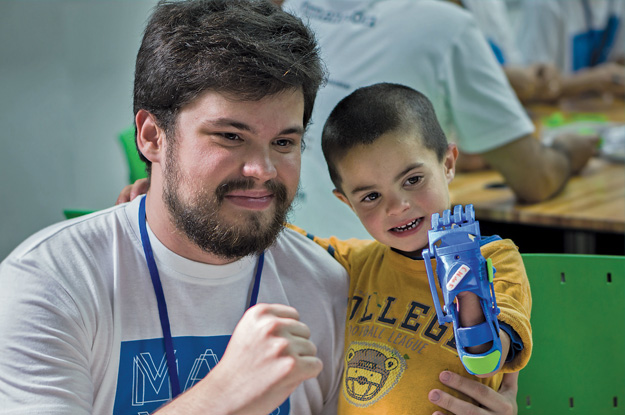This article is adapted from AQ’s most recent print issue. See our Top 5 Young Latin American entrepreneurs here. | Leer en español
Gino Tubaro grew up tinkering with household appliances — taking apart a clothes iron to make a robot, and gutting a loudspeaker to create a vacuum cleaner.
As he grew up, the Argentine inventor turned to projects with a purpose. At 22 years old, he’s developed a machine that translates text into Braille, and launched a project that uses open-source 3D printing technology to develop customized prosthetic hands for those who need them — for free.
That’s possible because the prostheses are produced by a network of volunteers who own 3d printers. They’re part of Limbs, a project run out of AtomicLab, an organization Tubaro founded in 2014, which he calls a hybrid of a foundation and a startup.
“I’ve always been curious about how things work,” said the unassuming Tubaro, who splits his time between the project and engineering classes at the National Technological University in Buenos Aires.
The idea for Limbs came when Tubaro experimented with 3D printers in high school. The mother of a little boy who needed a prosthetic hand asked if he could design one. He did. When he won a $60,000 award from the History Channel in 2015 for his creativity, he used the funds to buy 3D printers and set up the infrastructure.
AtomicLab, which has seven staffers, has distributed 650 prostheses so far — but demand has only grown. That’s because a custom-build prosthetic hand takes up to six months and $15,000 to make in Argentina. Tubaro’s design, adapted and printed by Limbs, takes 16 to 24 hours to produce, at no cost. The project has 5,000 people on a waiting list.
To help more people, Tubaro petitioned the Argentine regulatory agency to have their prosthetics recognized as medical devices. This way, the hands could be certified and distributed by health care providers. Until now, Limbs has worked as a research project.
Beyond notions of success (Tubaro declined to discuss revenue), the entrepreneur finds the work gratifying. This past Christmas, he delivered prostheses to children himself, dressed as Santa Claus.
“Many of them suffer from bullying,” he said of the project that returns self-confidence and movement to so many.
—
Soledad Dominguez is an independent journalist based in Brazil





